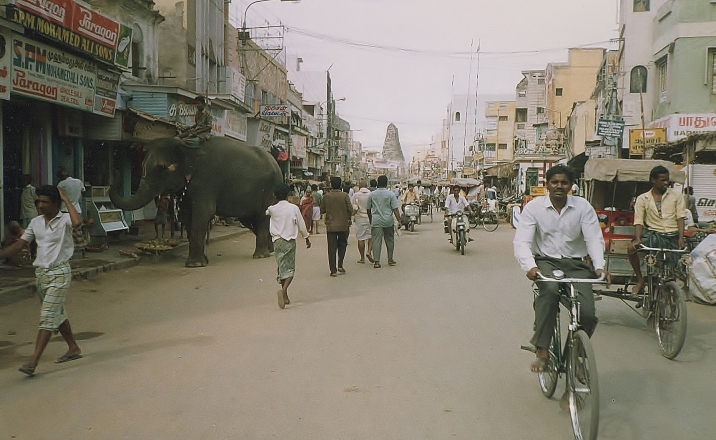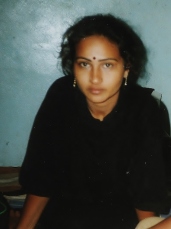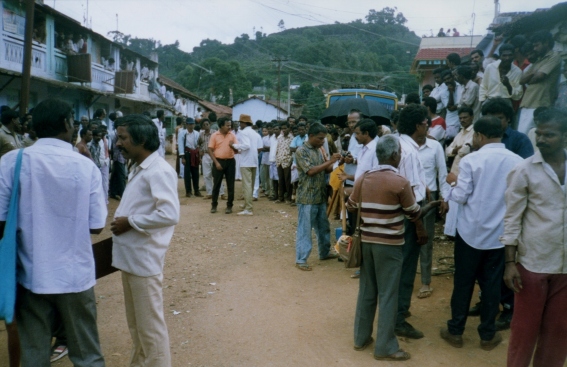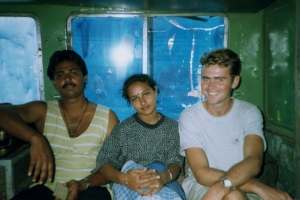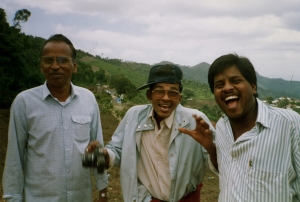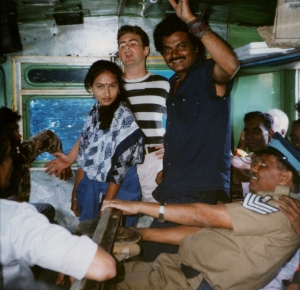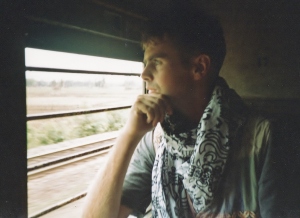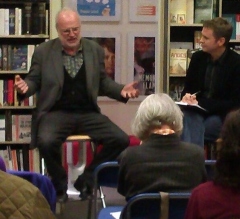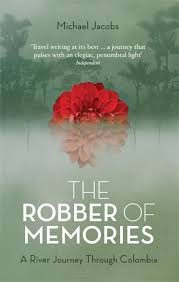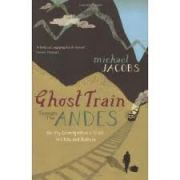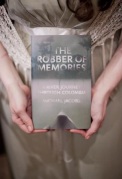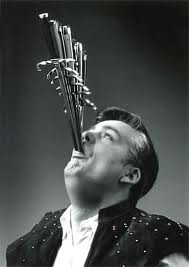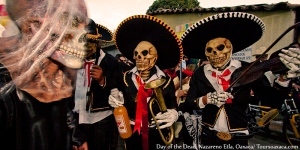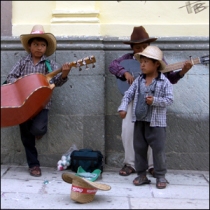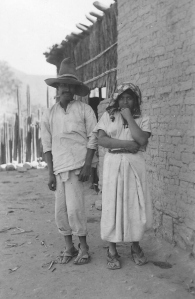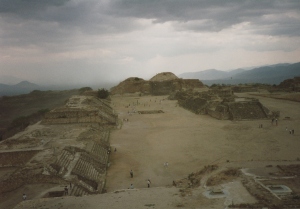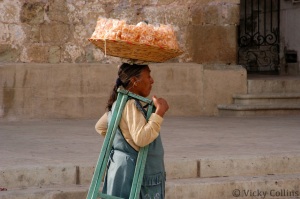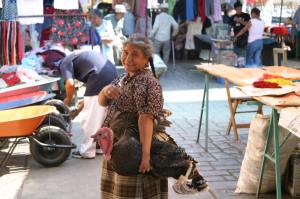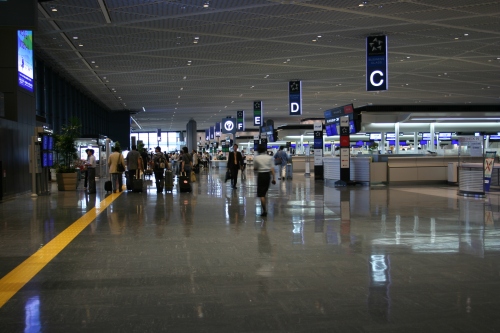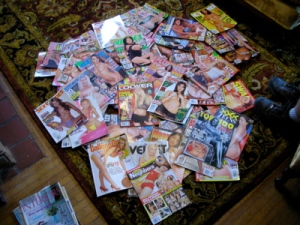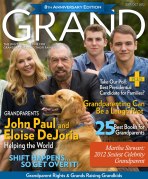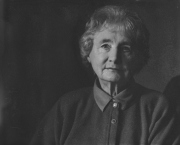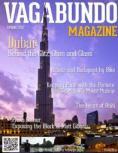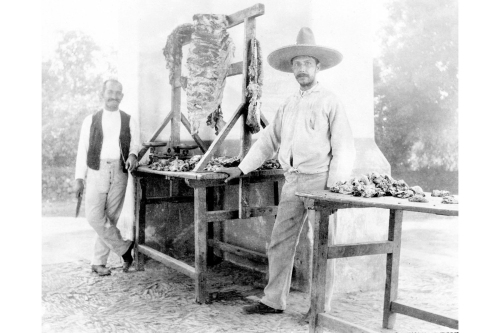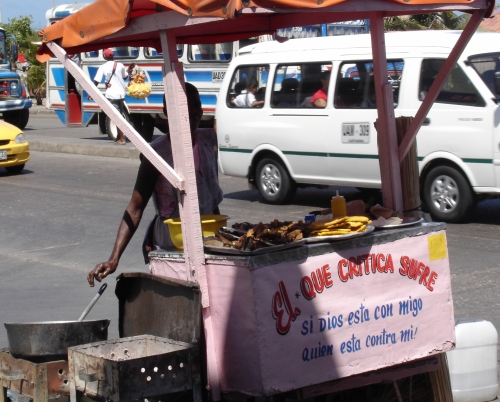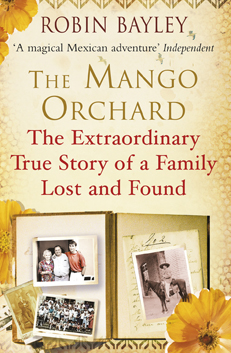A man ran towards me, waving. He wore over-sized sultan slippers and held on to a bejewelled turban. ‘Rope!’ he called out breathlessly, ‘I am in needing of some rope.’
‘Rope?’
‘And an ox, or perhaps an elephant.’
There was an explosion from further down the valley. ‘Please, no time to lose!’
We ran back down the narrow track. A brightly painted bus was stuck, its back wheels spinning furiously, ripping up turf; its tortured engine flat out. When the driver saw me he instinctively jammed on the brakes. The bus slid backwards, to the bottom of the hill.
There was silence apart from the hiss of steam from the radiator and the squelch of our shoes on the monsoon-drenched path. Five rifle-brandishing soldiers, who appeared to be wearing thick make up, peeked from behind the bus.
They tensed as I picked up a branch from the ground.
There are some advantages to having grown up in the interminable winters of northern England. I placed the branch in front of the rear tyres. The soldiers sprang into action, gathering more fallen foliage. They cheered as the bus inched up the slope. When it reached the road, the only man without a spat of dirt on his clothing, shook me warmly by the hand. He introduced himself as Joy. ‘Ha! You have saved us,’ he said, laughing. ‘Let me introduce you to our leading lady. You will be liking her very much.’
The sultan, the soldiers, the leading lady; it was beginning to make sense. We climbed aboard the bus, stepping round cameras and lighting rigs, to a woman sitting serenely at the back doing a crossword puzzle. She stood and brought her hands together. ‘I am Sophia,’ she said. ‘You are very handsome. You look like an apple. Would you like to be in our film?’
The director, a professorial man with a pencil thin moustache, strode towards me, appraising me through a frame of his thumbs and index fingers. ‘Drug smuggler,’ he said. ‘See you on set in the morning.’
By the following morning, rumour was rife that the Englishman who had ‘single-handedly saved the bus from a swamp’, was also a Hollywood star. On the five minute walk from my guest house to the bus, I was asked for my autograph seven times, and when I arrived, the crew all stood and applauded.
Maybe it was first morning nerves; perhaps it was a reaction to the Full Fortifying Monty breakfast, but as Joy ushered me aboard the bus, I felt an urgent need for a bathroom. He assured me the film location was only minutes away… 189 minutes to be precise.
As soon as the bus doors opened I lurched to a fence behind a line of trees. I did what I’d needed to do for nearly two hours and, feeling severely weakened, I turned to make my way back. There, standing staring at me, was a crowd of over a hundred men. ‘Hello,’ one of them said. ‘Would you like to visit my bicycle shop?’
A boy pushed his way through the crowd. ‘Please come,’ he said earnestly. ‘Police is needing to see you.’
I followed, the crowd a couple of yards behind me.
What had I done? Did I require a filming permit? Had I inadvertently soiled sacred ground?
The policeman puffed out his chest. ‘What,’ he demanded, ‘is being your name?’
I watched him make a note in a small book.
‘What country is it that you are coming from?’ Again, he jotted down my answer. ‘Why do we have your presence in our village?’
I could feel the crowd shifting nervously. The policeman slotted his notebook into a pocket.
‘Please to come with me.’
He led me away from the crowd towards an imposing building I took to be the jail. It was twice as high as the surrounding houses. Inside it was dark and damp.
‘Wait here,’ he said and left me.
Since that day my travels have led me into many sticky situations, but this was the first time I’d ever really thought I was in serious trouble.
The door opened and hundreds of people filed in and encircled me. Children giggled nervously. Light flooded the room once more. A giant with a long beard appeared in the doorway. He walked towards me in complete silence, carrying a ghetto blaster. His face creased into a princely smile.
‘I am the mayor,’ he said. ‘Mr Robin, it is a great pleasure to be having you in our village.’ He turned to address the assembled village. ‘We are blessed, truly blessed to have a star in our midst.’ There was a smattering of applause. ‘And now,’ he said, turning to me again. ‘Please,’ his hands pressed together as if in prayer ‘dance.’
‘What?’
He flashed his smile, wobbled his head and pressed play on the cassette recorder. The music that filled the room, the music to which I was being asked to dance in front of hundreds of strangers, was The Rivers of Babylon by Boney M.
It has a jaunty enough beat once it gets going, but it’s not a tune to encourage any true dance floor expression. I did my best. I clowned around, juggled invisible balls, and sashayed this way and that. By the end of the song I was running low on ideas. I bowed with a dramatic flourish, sure my performance would be found wanting. The assembled village erupted into wild, rapturous applause.
The mayor stepped forward and shook me vigorously by the hand. ‘Excellent, most very excellent!’ he said.
Standing grinning next to the mayor, was Sophia. The mayor hustled her forward. ‘And now…’ Another princely smile. ‘Again!’
Sophia, the Bollywood star, shimmied and twirled around me; coquettish and coy yet commanding. I couldn’t begin to match her dexterity and grace, so I merely mimicked her moves, and when she pirouetted behind me, pretended she’d pinched my bum.
The song finished. I saw the mayor move towards the cassette recorder but before he could rewind the tape once more the director whispered in his ear. Sophia and I were needed. Relieved, I walked, Sophia’s arm interlinked with mine, towards my film debut. I was going to be the best damn drug smuggler ever committed to celluloid.
But not today. My scene, the director promised, was scheduled for first thing in the morning.
I watched Sophia’s scene being shot. There was just one camera and no sound equipment. All the dialogue, music and effects would be dubbed in later. Watching Sophia face off with the money lender was to witness a master class in wordless expression. Her arms gestured and eyes flashed angrily, but her lips merely mumbled an approximation of the dialogue.
The following morning I was told the man playing the money lender had to return to being a taxi driver in Madurai and they needed to film his scene. Mine was bumped once more.
By the fifth day I reasoned that as everyone thought I was a film star, I may as well act like one.
‘I can’t work like this,’ I bawled at the director, ‘If I don’t film my scene today, I’m going.’
‘Why?’ he said.
‘I need to… go.’
‘I write scene especially for you.’
I thought he had done this days ago.
‘You will be chased,’ he said, with a dramatic sweep of his arms, ‘By entire village.’
I nodded. He paused.
‘Scene open with you running like crazy man. You can do that?’ he asked. ‘Like crazy man?’
Sure, I could run like crazy man.
‘You look behind, and see angry crowd; stones, stones throwing, Molotov cocktails throwing. Men shooting, but you running.’
I nodded again. This sounded more like it.
‘You running through tea plantation, but they don’t be getting you. You run through chai shop through the school and police station. A woman sitting at writing machine-’
‘A typewriter?’
‘Writing machine, yes. You push her and run outside and…’ He hesitated and looked round. A man rode by on a motorbike, carrying a live duck by the neck.
‘And,’ he continued, ‘You jump on motorcycle and drive away.’
He smiled. ‘Is scene pleasing you?’
It was.
‘We begin shooting in fifteen minutes.’
I ran to change into a black shirt I’d had made in Calcutta. It was the most convincing drug dealer outfit I had with me.
When I returned, the director had disappeared. I asked Joy where he’d gone.
‘For your scene he is wanting red sky.’ He looked up and squinted in the bright sunlight. ‘It surely will be happening tomorrow.’
The next morning I resumed my journey. A year later I received a letter from Joy. He said the film had been seen by only 17 million people. ‘Perhaps if you had stayed to film your scene, it would have been a success.’
